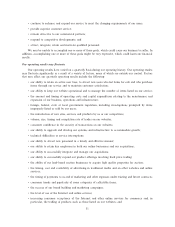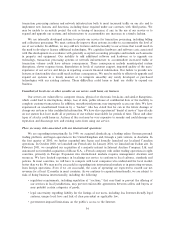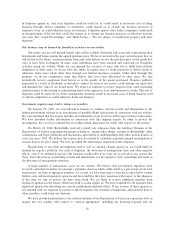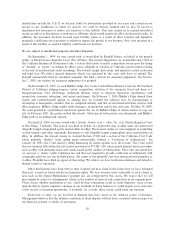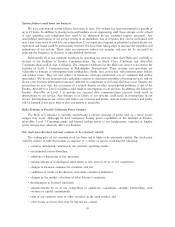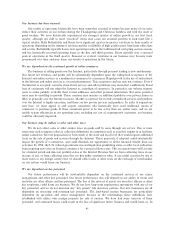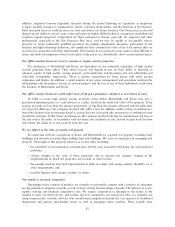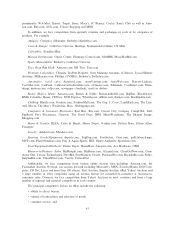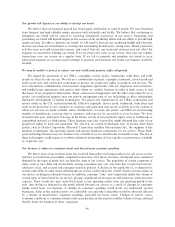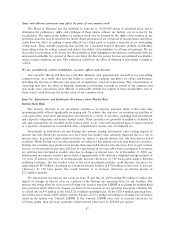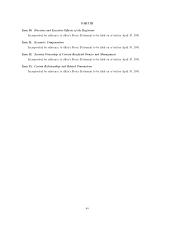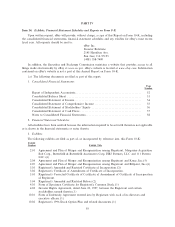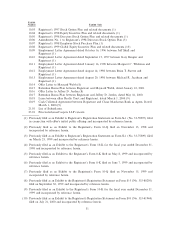eBay 2000 Annual Report Download - page 46
Download and view the complete annual report
Please find page 46 of the 2000 eBay annual report below. You can navigate through the pages in the report by either clicking on the pages listed below, or by using the keyword search tool below to find specific information within the annual report.Our business has been seasonal
Our results of operations historically have been somewhat seasonal in nature because many of our users
reduce their activities on our website during the Thanksgiving and Christmas holidays and with the onset of
good weather. We have historically experienced our strongest quarter of online growth in our Ñrst Ñscal
quarter, although our shift to more ""practical'' items may cause our seasonal patterns to look more like a
typical retailer. Both ButterÑelds and Kruse have signiÑcant quarter-to-quarter variations in their results of
operations depending on the timing of auctions and the availability of high quality items from large collections
and estates. ButterÑelds typically has its best operating results in the traditional fall and spring auction seasons
and has historically incurred operating losses in the Ñrst and third quarters. Kruse typically sees a seasonal
peak in operations in the third quarter. Seasonal or cyclical variations in our business may become more
pronounced over time and may harm our results of operations in the future.
We are dependent on the continued growth of online commerce
The business of selling goods over the Internet, particularly through personal trading, is new and dynamic.
Our future net revenues and proÑts will be substantially dependent upon the widespread acceptance of the
Internet and online services as a medium for commerce by consumers. Rapid growth in the use of and interest
in the Internet and online services is a recent phenomenon. This acceptance and use may not continue. Even if
the Internet is accepted, concerns about fraud, privacy and other problems may mean that a suÇciently broad
base of consumers will not adopt the Internet as a medium of commerce. In particular, our website requires
users to make publicly available their e-mail addresses and other personal information that some potential
users may be unwilling to provide. These concerns may increase as additional publicity over privacy issues on
eBay or generally over the Internet increase. Market acceptance for recently introduced services and products
over the Internet is highly uncertain, and there are few proven services and products. In order to expand our
user base, we must appeal to and acquire consumers who historically have used traditional means of
commerce to purchase goods. If these consumers prove to be less active than our earlier users, and we are
unable to gain eÇciencies in our operating costs, including our cost of acquiring new customers, our business
could be adversely impacted.
Our business may be subject to sales and other taxes
We do not collect sales or other similar taxes on goods sold by users through our service. One or more
states may seek to impose sales tax collection obligations on companies such as ours that engage in or facilitate
online commerce. Several proposals have been made at the state and local level that would impose additional
taxes on the sale of goods and services through the Internet. These proposals, if adopted, could substantially
impair the growth of e-commerce, and could diminish our opportunity to derive Ñnancial beneÑt from our
activities. In 1998, the U.S. federal government enacted legislation prohibiting states or other local authorities
from imposing new taxes on Internet commerce for a period of three years. This tax moratorium will last only
for a limited period and does not prohibit states or the Internal Revenue Service from collecting taxes on our
income, if any, or from collecting taxes that are due under existing tax rules. A successful assertion by one or
more states or any foreign country that we should collect sales or other taxes on the exchange of merchandise
on our system would harm our business.
We are dependent on key personnel
Our future performance will be substantially dependent on the continued services of our senior
management and other key personnel. Our future performance also will depend on our ability to retain and
motivate our other oÇcers and key personnel. The loss of the services of any of our executive oÇcers or other
key employees could harm our business. We do not have long-term employment agreements with any of our
key personnel, and we do not maintain any ""key person'' life insurance policies. Our new businesses are all
dependent on attracting and retaining key personnel. The land-based auction businesses are particularly
dependent on specialists and senior management because of the relationships these individuals have
established with sellers who consign property for sale at auction. We have had some turnover of these
personnel, and continued losses could result in the loss of signiÑcant future business and would harm us. In
41


